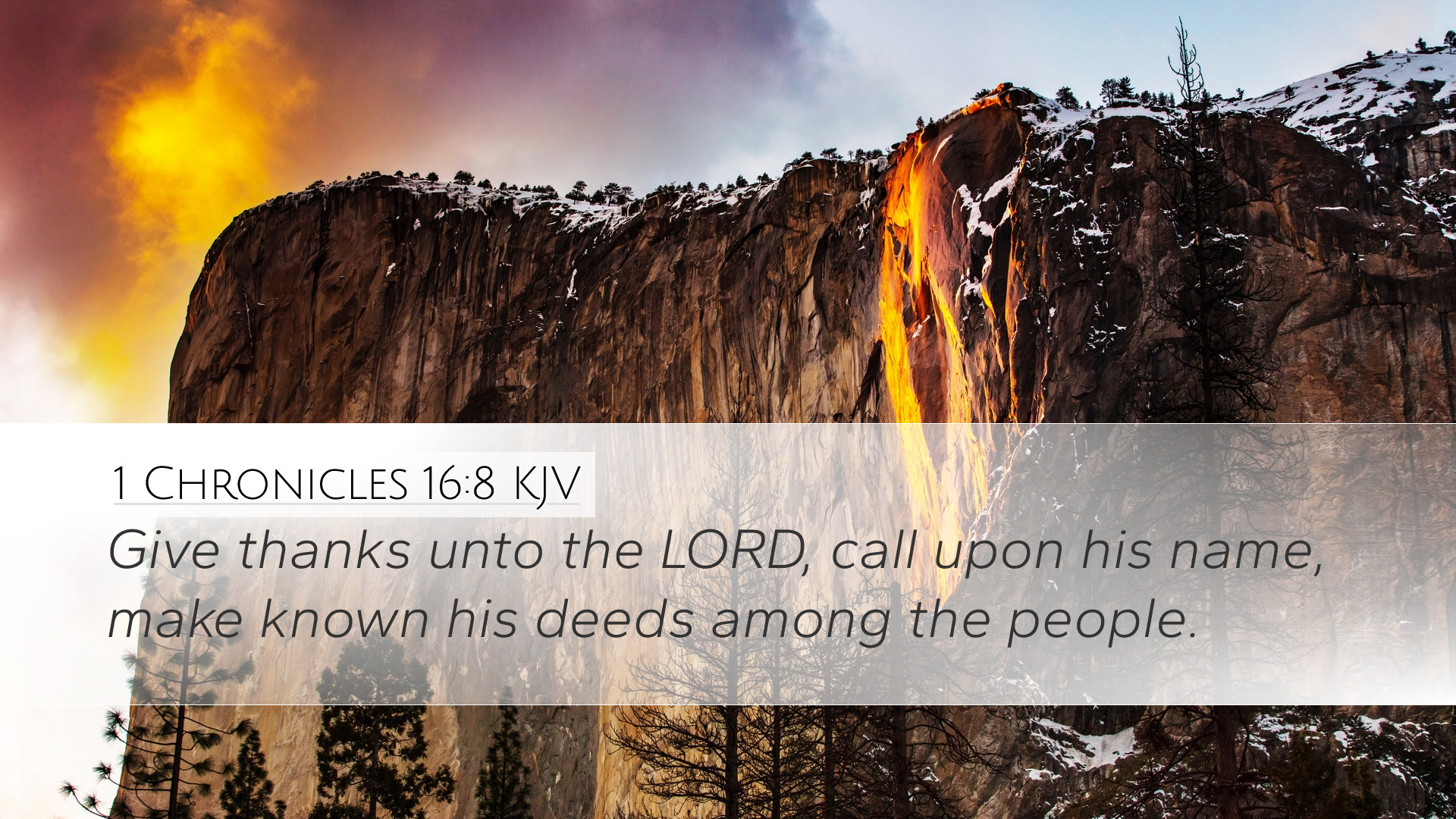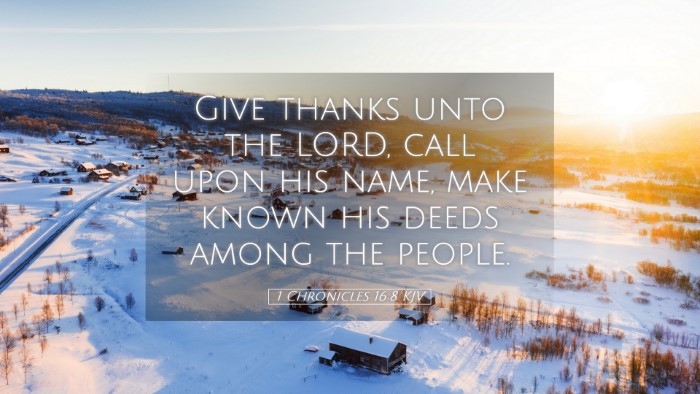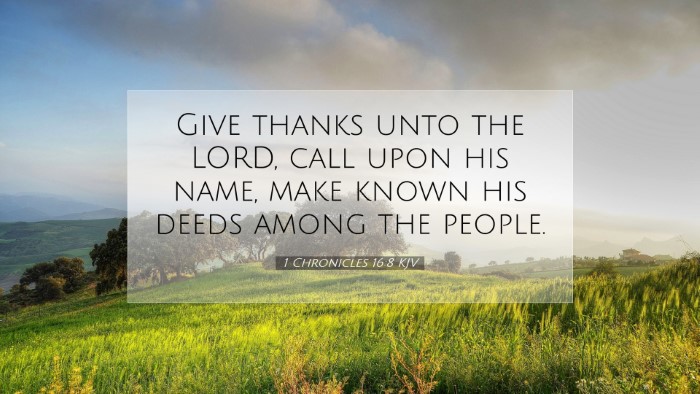Commentary on 1 Chronicles 16:8
1 Chronicles 16:8 states, "Give thanks unto the LORD, call upon his name, make known his deeds among the people."
This verse is a part of the song of thanksgiving that was sung by David and the people of Israel after the Ark of the Covenant was brought to Jerusalem. It encapsulates a profound call for gratitude and the proclamation of God's mighty acts, which serves as a foundation for worship and evangelism among the community of believers.
Insights from Public Domain Commentaries
Matthew Henry
According to Matthew Henry, this verse reflects the heart of worship: it is an exhortation to thankfulness and recognition of God's works. Henry highlights that the act of giving thanks is both a personal and communal responsibility among God's people.
-
Thanksgiving as a Duty: Henry emphasizes that giving thanks is not only a reflex act of gratitude but is also a commanded practice in the life of believers. It cultivates a grateful heart and raises awareness of God’s blessings.
-
Calling upon God's Name: To call upon the name of the Lord implies active communication with God, suggesting a relationship that requires dialogue, trust, and reliance on Him.
-
Making Known His Deeds: Sharing the wonderful works of God amongst the people is essential for communal faith-building. It fosters a sense of unity as believers recount God's faithfulness, which encourages others in their faith journey.
Albert Barnes
Albert Barnes focuses on the imperative nature of worship found in this verse. He asserts that the directive to "give thanks" and "call upon His name" serves as a reminder of the requisite response of believers towards God's continual mercy and grace.
-
The Nature of Worship: Barnes notes that to worship God involves acknowledging His sovereignty and goodness. The elements of thanks and calling upon Him are intertwined, suggesting that genuine worship inevitably leads to heartfelt thanksgiving.
-
Active Participation: Barnes highlights that worship is not a passive experience; it necessitates active involvement, including the declaration of God's deeds which informs and inspires collective worship among the congregation.
Adam Clarke
Adam Clarke provides an extensive analysis of the implications of this verse on community worship. He describes it as a basis for evangelism and witness to the nations.
-
Evangelistic Impulse: Clarke posits that the command to make known God's deeds among the people extends beyond the immediate community to all nations. This reflects the universal call of God to His people to share His glory and works.
-
Personal and Public Dimension: He stresses that while personal gratitude is crucial, sharing God’s deeds collectively serves to strengthen faith and impart hope to the community, drawing others to the worship of God.
-
Living Testimonies: Clarke suggests that believers, by recounting their testimonies of God's faithfulness, become living witnesses to God's character and works, fulfilling the mission to proclaim His greatness.
Theological Implications
The directives within 1 Chronicles 16:8 democratize worship by positioning all individuals as both recipients and proclaimers of God's goodness. This duality shapes the culture of a faith community that values testimony, gratefulness, and collective remembrance of God's mercies.
-
Community of Faith: A church that gives thanks and praises God collectively fosters a deeper sense of belonging and supports individuals in their spiritual growth through shared experiences of gratitude.
-
Impact on Worship Practices: Understanding the importance of vocal thanksgiving and declarations of God's deeds can lead congregations to incorporate more testimonies and collective praises in their worship services.
-
The Continuous Journey: The act of calling upon God's name indicates an ongoing relationship that encourages believers to rely on Him through all aspects of life, fostering dependency on His grace and mercy.
Practical Applications
The message of 1 Chronicles 16:8 can be applied in various ways across ministry contexts:
-
In Worship Services: Integrate opportunities for congregants to share personal testimonies and stories of how God has worked in their lives, celebrating God's deeds collectively.
-
In Small Groups: Encourage group members to express gratitude and recall God’s faithfulness, fostering an atmosphere of worship and thanksgiving in intimate settings.
-
Personal Reflection: Encourage individuals to create personal gratitude journals, recording God's deeds and answers to prayers, which can be shared in community settings to enhance shared faith.
Conclusion
1 Chronicles 16:8 serves as a timeless exhortation to all believers: to give thanks, to communicate with God, and to share His marvelous deeds among the people. By engaging actively in thanksgiving and proclamation, believers fulfill their calling to glorify God and serve as instruments of His grace in a world that desperately needs to witness the truth of His love and power.


